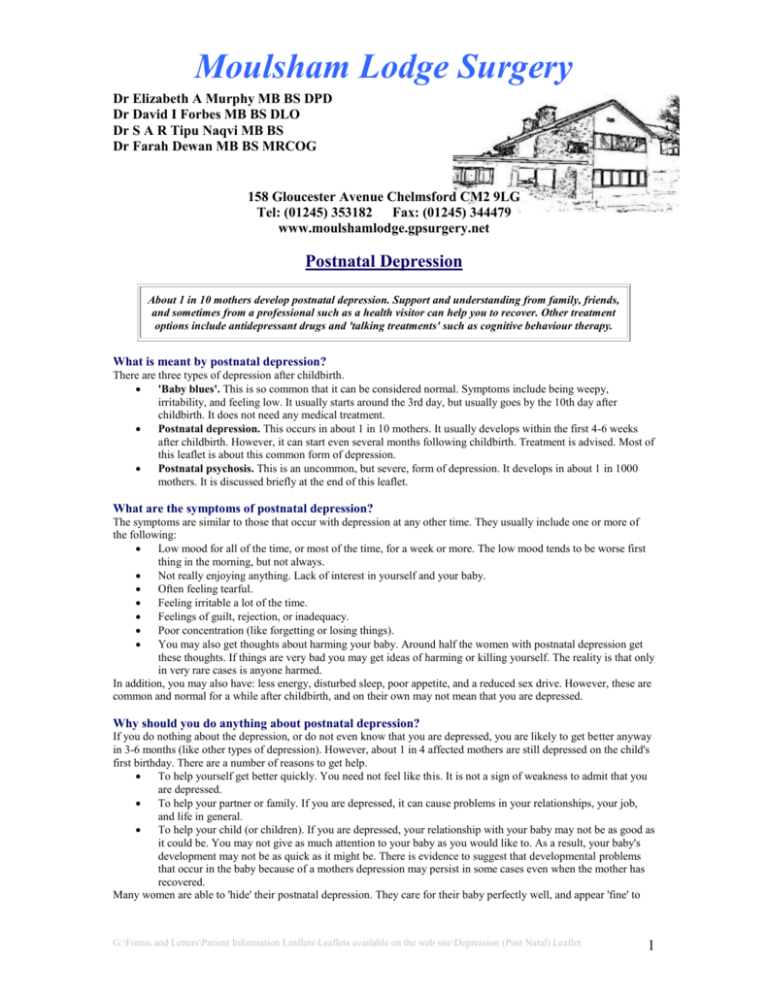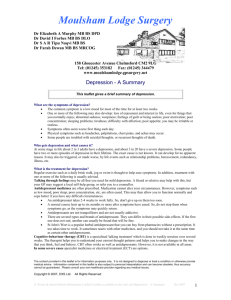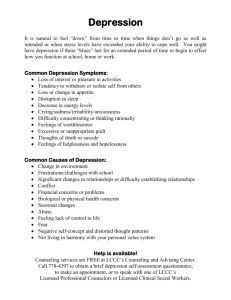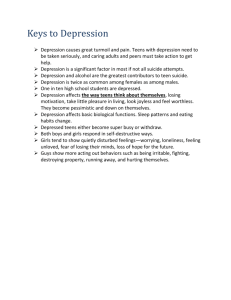
Moulsham Lodge Surgery
Dr Elizabeth A Murphy MB BS DPD
Dr David I Forbes MB BS DLO
Dr S A R Tipu Naqvi MB BS
Dr Farah Dewan MB BS MRCOG
158 Gloucester Avenue Chelmsford CM2 9LG
Tel: (01245) 353182 Fax: (01245) 344479
www.moulshamlodge.gpsurgery.net
Postnatal Depression
About 1 in 10 mothers develop postnatal depression. Support and understanding from family, friends,
and sometimes from a professional such as a health visitor can help you to recover. Other treatment
options include antidepressant drugs and 'talking treatments' such as cognitive behaviour therapy.
What is meant by postnatal depression?
There are three types of depression after childbirth.
'Baby blues'. This is so common that it can be considered normal. Symptoms include being weepy,
irritability, and feeling low. It usually starts around the 3rd day, but usually goes by the 10th day after
childbirth. It does not need any medical treatment.
Postnatal depression. This occurs in about 1 in 10 mothers. It usually develops within the first 4-6 weeks
after childbirth. However, it can start even several months following childbirth. Treatment is advised. Most of
this leaflet is about this common form of depression.
Postnatal psychosis. This is an uncommon, but severe, form of depression. It develops in about 1 in 1000
mothers. It is discussed briefly at the end of this leaflet.
What are the symptoms of postnatal depression?
The symptoms are similar to those that occur with depression at any other time. They usually include one or more of
the following:
Low mood for all of the time, or most of the time, for a week or more. The low mood tends to be worse first
thing in the morning, but not always.
Not really enjoying anything. Lack of interest in yourself and your baby.
Often feeling tearful.
Feeling irritable a lot of the time.
Feelings of guilt, rejection, or inadequacy.
Poor concentration (like forgetting or losing things).
You may also get thoughts about harming your baby. Around half the women with postnatal depression get
these thoughts. If things are very bad you may get ideas of harming or killing yourself. The reality is that only
in very rare cases is anyone harmed.
In addition, you may also have: less energy, disturbed sleep, poor appetite, and a reduced sex drive. However, these are
common and normal for a while after childbirth, and on their own may not mean that you are depressed.
Why should you do anything about postnatal depression?
If you do nothing about the depression, or do not even know that you are depressed, you are likely to get better anyway
in 3-6 months (like other types of depression). However, about 1 in 4 affected mothers are still depressed on the child's
first birthday. There are a number of reasons to get help.
To help yourself get better quickly. You need not feel like this. It is not a sign of weakness to admit that you
are depressed.
To help your partner or family. If you are depressed, it can cause problems in your relationships, your job,
and life in general.
To help your child (or children). If you are depressed, your relationship with your baby may not be as good as
it could be. You may not give as much attention to your baby as you would like to. As a result, your baby's
development may not be as quick as it might be. There is evidence to suggest that developmental problems
that occur in the baby because of a mothers depression may persist in some cases even when the mother has
recovered.
Many women are able to 'hide' their postnatal depression. They care for their baby perfectly well, and appear 'fine' to
G:\Forms and Letters\Patient Information Leaflets\Leaflets available on the web site\Depression (Post Natal) Leaflet
1
Moulsham Lodge Surgery
those around them. However, they suffer the condition as an internal misery. Do seek help if you are like this.
What causes postnatal depression?
The cause is not clear. Any mother can develop it. Some studies suggest that depression after childbirth is no more
common than at other times (depression is common). However, it is thought that women are more prone to develop
depression just after childbirth. The main cause seems to be stressful events after childbirth such as feelings of
isolation, worry, and responsibility about the new baby, etc. In addition, you are at greater risk of developing postnatal
depression if you have any of the following:
Mental health problems in the past (usually depression or a previous postnatal depression).
Depression during the pregnancy.
Marital or relationship problems.
No close friends or family around you.
Money troubles.
Physical health problems following the birth (such as anaemia, urinary incontinence, etc).
In many cases, there is no apparent cause. The normal change in hormones after the birth is not thought to be a cause.
How is postnatal depression diagnosed?
The diagnosis is usually made by a doctor based on what you, and those who know you, tell him or her. You may not
recognise that you are depressed. However, your partner will probably have noticed that you are different, and may not
understand why. A friend or family member may suggest that you see a doctor. Sometimes your doctor may do a blood
test to make sure that there is not a physical reason for the symptoms such as an underactive thyroid or anaemia. In one
study, only 1 in 4 women with postnatal depression sought any help. Therefore, a short questionnaire has been designed
to help diagnose postnatal depression. This is called the Edinburgh Postnatal Depression Scale and has 10 simple
questions. Your doctor or health visitor may ask you to fill it in if they suspect that you have postnatal depression.
What are the treatments for postnatal depression?
Support and advice
Understanding and support from family and friends can help you to recover. It is often best to talk to close friends and
family to explain how you feel rather than bottling up your feelings. Support and help from a health visitor can also
help. Do tell your health visitor if you feel depressed as they may be able to talk things through with you. Independent
advice about any social problems may be available and of help (money issues, child care, loneliness, relationships, etc).
Ask your health visitor about what is available in your area. Also, ask about which support or self-help groups are
available. You may be surprised at how many women feel the same way as you. Self-help groups are good at providing
encouragement and support, as well as giving advice on how best to cope.
Antidepressants
An antidepressant drug is commonly prescribed for women with postnatal depression, especially if the depression is
moderate or severe. Symptoms such as low mood, poor sleep, poor concentration, irritability, etc, are often eased with
an antidepressant. This may then allow you to function normally, and increase your ability to cope better with your new
baby.
Antidepressants do not usually work straight away. It takes 2-4 weeks before their effect builds up fully. A common
problem is that some people stop the drug after a week or so as they feel that it is doing no good. You need to give it
time. Also, if it is helping, follow the course that a doctor recommends. A normal course of antidepressants lasts up to
six months or more after symptoms have eased. Some people stop treatment too early and the depression quickly
returns. There are several types of antidepressants, each with various 'pros and cons'. For example, they differ in their
possible side-effects. (The leaflet that comes in the drug packet provides a full list of possible side-effects.) If the first
one that you try does not suit, then another may be found that is fine. Therefore, tell your doctor if you have any
problems with an antidepressant. Antidepressants are not tranquillisers and are not thought to be addictive. About 5-7
in 10 people with moderate or severe depression improve within a few weeks of starting treatment with a prescribed
antidepressant. However, up to 3 in 10 people improve with dummy tablets (placebo) as some people would have
improved in this time naturally. So, you are roughly twice as likely to improve with antidepressants compared to taking
no treatment. However, they do not work in everybody. Some antidepressants come out in breastmilk. The amounts are
very small and are unlikely to cause any harm to the baby. However, if you are breastfeeding your doctor is likely to
choose a drug that is well established and has a good safety record with breastfeeding mothers rather than a newer drug
with less data about confirming safety in babies.
Talking (psychological) treatments
Another treatment option is to be referred to a psychologist or other professional for a talking treatment. There are
various types, but their availability on the NHS can vary in different parts of the country. Talking treatments include
the following.
Cognitive therapy. Briefly, cognitive therapy is based on the idea that certain ways of thinking can trigger, or
'fuel', certain mental health problems such as depression. The therapist helps you to understand your thought
patterns. In particular, to identify any harmful, unhelpful, and 'false' ideas or thoughts which you have that
G:\Forms and Letters\Patient Information Leaflets\Leaflets available on the web site\Depression (Post Natal) Leaflet
2
Moulsham Lodge Surgery
can make you depressed. The aim is then to change your ways of thinking to avoid these ideas. Also, to help
your thought patterns to be more realistic and helpful. Therapy is usually done in weekly sessions over
several months. You are likely to be given 'homework' between sessions.
Cognitive-behaviour therapy (CBT). This is a combination of cognitive therapy and behaviour therapy.
Behaviour therapy aims to change any behaviours which are harmful or not helpful. In short, CBT helps
people to achieve changes in the way that they think, feel and behave. (See separate leaflet for more details
on CBT.)
Other types of therapy sometimes used include: interpersonal therapy, problem-solving therapy and
psychodynamic psychotherapy. Also, some studies suggest that counselling types of treatment given by
trained health visitors in short sessions over several weeks can be of help to ease postnatal depression.
For moderate depression, the number of people who improve with cognitive therapy and cognitive behaviour therapy is
about the same as with antidepressants. Talking treatments may not be so good for some people with severe depression.
This is because you need some motivation to do these treatments and people with severe depression often find
motivation difficult. Bear in mind, talking treatments are sometimes not practical for women with postnatal depression
due to the time commitments required. Also, there is often a waiting list. Some research suggests that a combination of
an antidepressant plus a talking treatment such as CBT is better than either treatment alone.
Exercise
Regular exercise such as jogging, swimming, gym sessions, etc, is thought to help ease symptoms (if you are able to do
some exercise).
Other treatments
St John's Wort (hypericum)
This is a herbal antidepressant that you can buy from pharmacies without a prescription. It recently became a popular
'over the counter' treatment for depression. However, many doctors now do not advise that you take this because:
It is not clear how well it works. Although some studies suggest that it may help depression, other studies
have failed to confirm this.
Side-effects sometimes occur. (Some people think that because St John's wort is 'natural' then it is totally
safe. This is not true. It contains many chemicals which sometimes cause problems.)
It may react with other drugs that you may take. Sometimes the reactions can cause serious problems. For
example, you should not take St John's wort if you are taking warfarin, oral contraceptives, cyclosporin,
anticonvulsants, digoxin, theophylline, or some anti-HIV drugs. Also, you should not take it at the same time
as some prescribed antidepressants.
Specialist and hospital based treatments
Other treatments such as specialist drugs or electrical treatment (ECT) may be advised if you have severe depression
that has not improved with other treatments.
Some dos and don'ts about depression
Don't bottle things up and 'go it alone'. Try and tell people who are close to you how you feel. It is not weak
to cry or admit that you are struggling.
Don't despair - most people with depression recover. It is important to remember this.
Do try and distract yourself by doing other things. Try doing things that do not need much concentration but
can be distracting such as watching TV. Radio or TV is useful late at night if sleeping is a problem.
Do eat regularly, even if you do not feel like eating.
Don't drink too much alcohol. Drinking alcohol is tempting to some people with depression as the immediate
effect may seem to relieve the symptoms. However, drinking heavily is likely to make your situation worse in
the long run.
Don't make any major decisions whilst you are depressed. If at all possible you should delay any major
decisions about relationships, jobs, or money until you are well again.
Do tell your doctor if you feel that you are getting worse, particularly if suicidal thoughts are troubling you.
Will it happen again?
If you have an episode of postnatal depression you have a greater than average chance of it happening again if you have
another baby. About 3 in 10 mothers who have postnatal depression have another episode of depression if they have
another baby. However, you and your doctor are more likely to be aware of the possibility in future pregnancies. This
means that you are more likely to be diagnosed and treated promptly should it recur.
What is postnatal psychosis?
Postnatal psychosis is an uncommon, but severe, form of depression that can occur after childbirth. As well as
symptoms of severe depression, there are also other serious symptoms such as delusions (false beliefs), hallucinations
(such as hearing voices), odd behaviours, and irrational thoughts. Affected mothers may not recognise that they are ill.
If you are a relative or friend of a mother who appears to be acting strangely, then do alert a doctor or health visitor.
G:\Forms and Letters\Patient Information Leaflets\Leaflets available on the web site\Depression (Post Natal) Leaflet
3
Moulsham Lodge Surgery
There is a risk of harm to both mother and baby in this uncommon, but serious, mental illness. But note: the vast
majority of women with postnatal depression do not develop this severe form of depression.
Further help and information
See you health visitor for further advice. The following may also be of help:
Association for Post-Natal Illness
145 Dawes Road, Fulham, London, UK, SW6 7EB
Tel: 020 7386 0868 Web: www.apni.org
Aims to help women who suffer from postnatal depression.
PNi-SHA - PostNatal illness-Support & Help Association
PO Box 7066, Ashbourne, Derbyshire, DE6 1JQ
Web: www.pnisha.org.uk
A charitable organisation which is dedicated to offering information, emotional support and practical help to women
and their families, affected by any type of antenatal and postnatal illness.
MAMA (Meet-A-Mum-Association)
Helpline: 0845 120 3746 (7pm - 10pm weekdays Only) Web: www.mama.co.uk
Services includes advice and support for mothers with postnatal depression.
© EMIS and PIP 2006 Updated: October 2006 PRODIGY Validated
Patient Information
Copyright © 2007, Egton Medical Information Systems Limited
The content provided in this leaflet is for information purposes only. It is not designed to diagnose or treat a condition or otherwise provide medical
advice. Information contained in this leaflet is also subject to personal interpretation and can become obsolete, thus accuracy cannot be guaranteed.
Please consult your own healthcare provider regarding any medical issues.
G:\Forms and Letters\Patient Information Leaflets\Leaflets available on the web site\Depression (Post Natal) Leaflet
4
Moulsham Lodge Surgery
Copyright © 2007, DXS Ltd.
All Rights Reserved
G:\Forms and Letters\Patient Information Leaflets\Leaflets available on the web site\Depression (Post Natal) Leaflet
5






